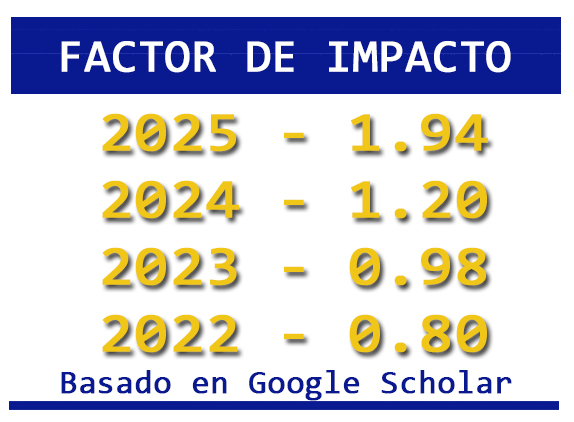ASOCIACION DEL POLIMORFISMO VAL108/158 MET Y RESPUESTA AL TRATAMIENTO CON LITIO
DOI:
https://doi.org/10.36790/epistemus.v12i24.56Keywords:
Transtorno Bipolar, Gen COMT, LitioAbstract
Se realizó un estudio prospectivo, descriptivo y de asociación de casos y controles con respuesta y no respuesta al tratamiento con litio. Se realizó posteriormente extracción de DNA por medio de buffy coat y, genotipificación del rs4680 mediante el método fluorogénico 5´-exonucleasa y discriminación alélica por el software applyed biosystem 1.3 V. Se utilizó la escala de Alda para valorar la respuesta a litio. El análisis estadístico se realizó por el programa SPSS. El análisis entre los pacientes respondedores y no respondedores a litio no mostró diferencias estadísticamente significativas tanto entre las frecuencias genotípicas (X2 =2.07, p = 0.354) y las alélicas (X2 = 0.39, p = 0.529. No se encontró asociación significativa entre el polimorfismo del rs4680 entre los respondedores y no respondedores a la terapia con litio, por lo que una sugerencia seria ampliar más la muestra de estudio para tener una conclusión final.
Downloads
References
P. Timms. “TRASTORNO BIPOLAR (MANÍACO DEPRESIVO)”. Royal Collage of Psychiatrists, 2007.
C.M. Bonnin, A. Martinez-Aran. “Trastorno bipolar, funciones cognitivas y eje hipotalámico-pituitario-tiroideo”. Universidad de Barcelona, 2010.
Guía de Práctica Clínica, “Diagnóstico y Tratamiento del Trastorno Bipolar”, México Secretaría de Salud, 2009.
P. Alexis GEOFFROY, Bruno ETAIN. “Circadian genes and lithium response in bipolar disorders: Associations with PPARGC1A (PGC-1α) and RORA.” . Genes Brain Behav,2016. DOI: https://doi.org/10.1111/gbb.12306
L. Hou, E. Bergen. “Genome-wide association study of 40,000 individuals identifies two novel loci”. Oxford University, 2016.
J. Oedegaard, M. Alda. “The Pharmacogenomics of Bipolar Disorder study (PGBD): identification of genes for lithium response in a prospective sample”. BMC Psychiatry, 2016. DOI: https://doi.org/10.1186/s12888-016-0732-x
L. Hou, U. Heilbronner. “Genetic variants associated with response to lithium treatment in bipolar disorder: a genome-wide association study”, 2016; http://www.thelancet.com/journals/lancet/article/PIIS0140-6736(16)00143-4/abstract.
S. Hossein Fatemi, J. Reutiman, D. Folsom. “The role of lithium in modulation of brain genes: relevance for aetiology and treatment of bipolar disorder”. Biochemical Society Transactions vol. 37, 2009. DOI: https://doi.org/10.1042/BST0371090
H. Silva. “Mecanismos de acción de los estabilizadores del ánimo’”, Revista chilena de neuro-psiquiatría, 2001. DOI: https://doi.org/10.4067/S0717-92272001000300006
J. García. “Neuroquímica de los trastornos bipolares”. http://www.psiquiatria.com/articulos/trastorno_bipolar/2156/ (accessed http://documents.mx/documents/neuroquimica-de-los-trastornos-bipolarespdf.html).
S. Souza MG, M. Vieira. “COMT polymorphisms as predictors of cognitive dysfunction during manic and mixed episodes in bipolar I disorder”. Bipolar Disorders, 2012.
F. Benedetti, S. Dallaspezia. “Association between ctechol-O-methyltransferase Val (108/158) Met polymorphism and psychotic features of bipolar disorder”. Journal of Affective Disorders, 2010; www.elsevier.com/locate/jad. DOI: https://doi.org/10.1016/j.jad.2010.01.005
H. Lee, Y. Kim. “Catechol-O-methyltransferase Val158Met polymorphism affects therapeutic response to mood stabilizer in symptomatic manic patients”. Psychiatry Research, 2008; www.elsevier.com/locate/psychres.
J. Rybakowski. “Factors associated with lithium efficacy in bipolar disorder”. Harv Rev Psychiatry vol 22, 6, 2014. DOI: https://doi.org/10.1097/HRP.0000000000000006
B. Baune, C. Hohoff, K. Berge. “Association of the COMT val158met Variant with Antidepressant Treatment Response in Major Depression”. Neuropsychopharmacology 2008; www.neuropsychopharmacology.org DOI: https://doi.org/10.1038/sj.npp.1301462
K. Janusz. Rybakowski. “Genetic Influences on Response to Mood Stabilizers in Bipolar Disorder”. CNS Drugs, 2013; Springerlink.com. DOI: https://doi.org/10.1007/s40263-013-0040-7
M. Muñiz de la Torre. “TRATAMIENTO FARMACOLÓGICO DEL TRASTORNO BIPOLAR’”, Unidades Docentes de Psiquiatría del Instituto Psiquiátrico José Germain de Leganés y del Hospital Universitario 12 de Octubre (Madrid), 2001.
Downloads
Published
How to Cite
Issue
Section
License

This work is licensed under a Creative Commons Attribution-NonCommercial-NoDerivatives 4.0 International License.
The magazine acquires the patrimonial rights of the articles only for diffusion without any purpose of profit, without diminishing the own rights of authorship.
The authors are the legitimate owners of the intellectual property rights of their respective articles, and in such quality, by sending their texts they express their desire to collaborate with the Epistemus Magazine, published biannually by the University of Sonora.
Therefore, freely, voluntarily and free of charge, once accepted the article for publication, they give their rights to the University of Sonora for the University of Sonora to edit, publish, distribute and make available through intranets, Internet or CD said work, without any limitation of form or time, as long as it is non-profit and with the express obligation to respect and mention the credit that corresponds to the authors in any use that is made of it.
It is understood that this authorization is not an assignment or transmission of any of your economic rights in favor of the said institution. The University of Sonora guarantees the right to reproduce the contribution by any means in which you are the author, subject to the credit being granted corresponding to the original publication of the contribution in Epistemus.
Unless otherwise indicated, all the contents of the electronic edition are distributed under a license for use and Creative Commons — Attribution-NonCommercial-ShareAlike 4.0 International — (CC BY-NC-SA 4.0) You can consult here the informative version and the legal text of the license. This circumstance must be expressly stated in this way when necessary.
The names and email addresses entered in this journal will be used exclusively for the purposes established in it and will not be provided to third parties or for their use for other purposes.















